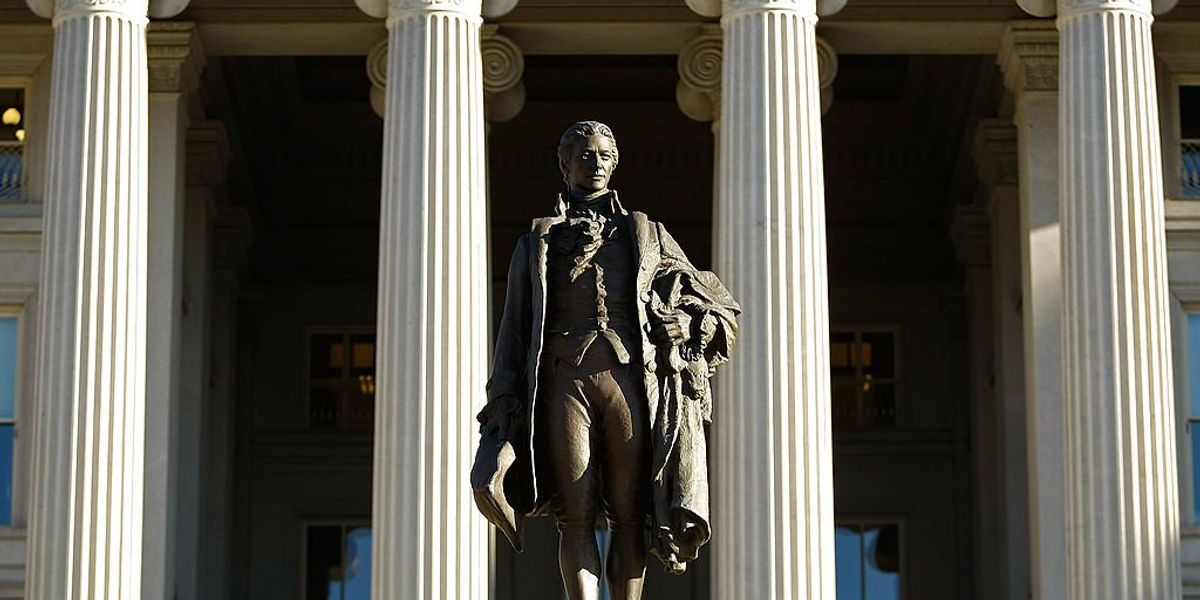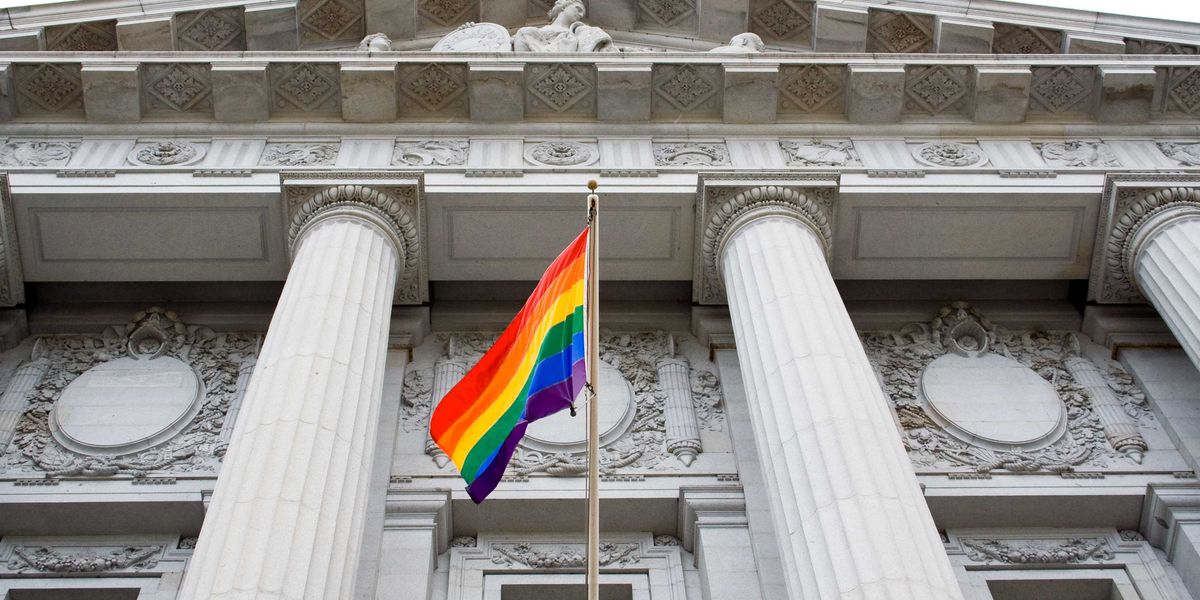Prominent voices on the left and within movement conservatism have argued that President Trump’s approach to foreign trade is strange, unorthodox, and even un-American. This is not surprising. After all, doctrinaire commitment to free trade — and doctrinaire distaste for protecting American industry — has been the dominant view among elites of both major political parties for at least a generation.
Against this backdrop, it is no wonder that Trump’s actions on trade appear as a wholly irrational disruption of a system that, according to our political elites, does not need to be discarded.
Hamilton would find it perfectly sensible of Trump to hold that other nations should give America something of value in exchange for access to our vast market.
This view of the matter, however, is based on an incomplete understanding of the American political tradition. Trump’s approach to trade policy has deep roots in American history, as we can see if we cast our gaze further back than we are accustomed to doing. It does not go too far to say that America’s founders would find Trump’s approach to international commerce perfectly intelligible and respectable.
The most obvious way to link President Trump to the founders is to invoke the justly celebrated name of Alexander Hamilton. The “Report on Manufactures,” Hamilton’s most famous state paper during his tenure as George Washington’s treasury secretary, laid out policy objectives that are essentially the same as those being defended by Trump and the members of his Cabinet who are responsible for trade policy.
It was necessary, Hamilton contended, to exert the government’s authority to promote American manufacturing to counteract the “artificial policy” of other nations that sought to exclude or disadvantage American goods. The ultimate aim of such a policy, he explained, was not the “vain project of selling everything and buying nothing” — it was instead to secure America’s vital national interests.
Hamilton argued that national “independence and security” are the “great objects” of all governments, thus requiring each country to “possess within itself all the essentials of national supply,” especially “the means of subsistence, habitation, clothing, and defense.” Having such goods available within one’s own country, he continued, “is necessary to the perfection of the body politic, to the safety as well as the welfare of the society.”
No strange departure
It is hard to see much daylight between Hamiltonian trade principles and President Trump’s desire to have the products necessary to American security and prosperity built in the United States.
The nationalist character of Hamilton’s thinking about trade policy, moreover, did not emerge after the founding as some strange departure from its essential principles. Rather, such nationalism was evident earlier, especially in the prominent part Hamilton played in the debates over the ratification of the Constitution.
Writing in “The Federalist Papers,” Hamilton observed that one of the great advantages of a union of states under one government was the power it would confer on the nation to “oblige foreign countries to bid against each other for the privileges of our markets.” Elsewhere in “The Federalist Papers,” Hamilton suggested that the restrictive trade policies nations sometimes pursue are not properly viewed as “injuries” but simply as “justifiable acts of independent sovereignties consulting a distinct interest.”
Hamilton, then, would find it perfectly sensible of President Trump to hold that other nations should be willing to give America something of value in exchange for access to our vast market. His arguments similarly anticipated Trump’s frequent remarks that while other nations will inevitably act in their own interest, they likewise must understand that we intend to act in our own interest as well.
The preceding argument is enough to show that Trump’s thinking about trade policy has venerable roots in the American political tradition. After all, who is more American than Alexander Hamilton?
We can go further, however. Trump’s approach broadly represents not just the Hamiltonian strain of American economic nationalism but the common sense of the founding-era generation itself. Indeed (and as I have observed elsewhere at greater length) the authority to regulate trade with foreign nations was included in the Constitution precisely for the purposes for which the Trump administration is now wielding it.
Regulating commerce was uncontroversial
In his massive and highly regarded “Commentaries on the Constitution of the United States,” Joseph Story — John Marshall’s great colleague on the early Supreme Court — observed that the power to regulate foreign commerce was so obviously necessary in a complete and effective government that it was hardly even a matter of controversy at the Constitutional Convention.
Commerce, Story suggested, is important to “the prosperity of nations.” Nevertheless, the prosperity of American commerce had been thwarted by the restrictive policies of other nations during the time America was governed by the Articles of Confederation, which conferred on the government no authority to regulate America’s foreign trade.
On Story’s telling, before the Constitution was adopted, American commerce “was regulated by foreign nations with a single view to their own interests; and our disunited efforts to counteract their restrictions were rendered impotent by a want of combination.” Under the Constitution, however, the government of the United States has the power to control access to the entire American market and hence has the ability to retaliate against the excessively self-regarding trade policies of other nations.
The Trump administration is simply using this constitutional power in an attempt to secure an arrangement that is more mutually beneficial for the United States and our trading partners.
Just as the founders anticipated
Story’s understanding of these matters was by no means idiosyncratic or partisan. On the contrary, essentially the same views were expressed by James Madison, the “father of the Constitution.”
Writing to James Monroe in 1785, Madison expressed his personal wish that “no regulations of trade, that is to say, no restrictions or imposts whatever, were necessary.” “A perfect freedom” of trade, he continued, “is the system which would be my choice.” Nevertheless, he immediately added, for such a system to be “attainable, all other nations must concur in it.” And if any other nation imposed restrictions on American trade, Madison continued, it would be appropriate for America to “retort the distinction” — in other words, to impose retaliatory restrictions of its own. Indeed, Madison held that to question the propriety of such economic retaliation would be “an affront to every citizen who loves his country.”
Similarly, in the preface to his notes on the Constitutional Convention, Madison observed that the lack of a commerce power under the Articles of Confederation had “produced in foreign nations … a monopolizing policy injurious to the trade of the U.S.” and further suggested that the appropriate response would be a “countervailing policy on the part of the U. States.” Such a policy became possible because the new Constitution included a power to regulate trade with foreign nations — the power the Trump administration is wielding to secure more advantageous trade relations for America, just as the founders anticipated.
None of this is to say that the founders would have approved of the specific steps the Trump administration has taken in the last several weeks. No one can pretend to know how they would apply their principles to the changed circumstances of the present. Nor is it to say that the founders would approve the extent to which the Congress has delegated its foreign commerce power to the president. It is to say, however, that Trump’s aims, and the kind of tools he is using to achieve them, would be unobjectionable to those who founded our nation and established our form of government.
Editor’s note: A version of this article appeared originally at the American Mind.
Read the full article here







![CA Dem Campaign Implodes, Getting Beat by Someone Who Isn’t Even Running [WATCH] CA Dem Campaign Implodes, Getting Beat by Someone Who Isn’t Even Running [WATCH]](https://www.rvmnews.com/wp-content/uploads/2025/10/2025.10.11-01.49-rvmnews-68ea6064be380.jpg)



![Plant Explosion Rocks Rural Community, No Survivors Found in Tennessee [WATCH] Plant Explosion Rocks Rural Community, No Survivors Found in Tennessee [WATCH]](https://www.lifezette.com/wp-content/uploads/2025/10/2025.10.11-07.50-lifezette-68eab51184111.jpg)
